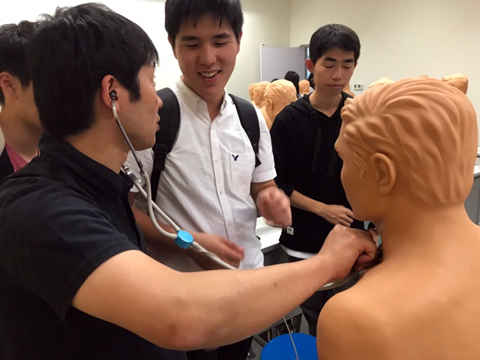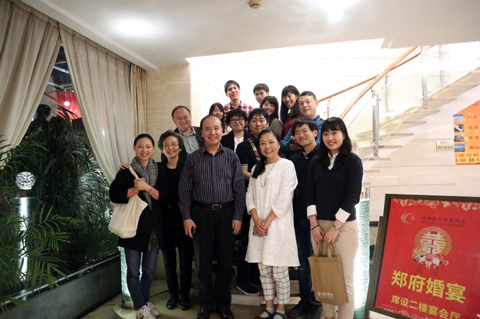International and Domestic exchange
Yuki Fukujiyama (2nd year student)
After completing my study abroad at Shantou University in China
When I first learned about this study abroad program at Shantou University in China, I was reluctant to participate. This was because I couldn't figure out what I would learn and how I would be able to use it when I became a doctor in Japan. However, after reading the presentations and reports of my seniors who had actually studied abroad, I learned about the contents of this program, and wanted to see the actual medical field in China with my own eyes and understand the various differences between Japan and China in terms of medical care and philosophy, so I strongly wanted to participate. After studying abroad, I would like to report on four things that made the biggest impression on me.
The first is about the curriculum of School of Medicine in China. School of Medicine in China have a five-year curriculum, and like us, students start from basic medicine, and there are also exams equivalent to graduation exams and national exams, but the difference with Japan is that an English level test is conducted, and students are not even eligible to take the graduation exam unless they have a certain level of English proficiency. This system is not only required to accommodate foreigners coming to China, but also to actively study abroad in order to improve the quality of Chinese medicine. In addition, when we toured Shantou University, the university's facilities were more complete than those in Japan, and the environment was well-equipped to train high-quality doctors. Among the things we visited were a computer that uses a doll that realistically simulates heart sounds, heart disease, arrhythmia, and breathing sounds, and allows you to experience and learn the differences in heart sounds and breathing sounds for each pathology by placing a stethoscope in the correct position, just like diagnosing an actual patient, and a facility where you can perform virtual mock surgeries that you can use after becoming a clinical doctor. We were not able to experience the mock surgery because the computer was still being adjusted, but it seems to reproduce the reactions of a real human.
The second is the high level of awareness among medical students at Shantou University. School of Medicine in China are not as popular as in Japan, and there are even universities where the number of students is below capacity. The reason for this is that, unlike in Japan and the West, doctors in China do not enjoy a high status or income. Another reason for their unpopularity is that doctors are considered to be part of the service industry, and they have to see many patients, which is very hard work. Based on this information before studying abroad, I thought that Chinese medical students were not as conscious as Japanese students. However, when I visited a poor area on the second day, the students from Shantou University that I met were volunteering by setting up temporary clinics once a month in areas that did not have clinics, testing local residents' blood pressure and eyesight, and providing necessary treatments free of charge. Together with the students, I distributed pamphlets about the free clinic to local residents to raise awareness of health. At that time, the students said that it is not that difficult to get into School of Medicine in China, but the studies after enrollment are really difficult. However, I felt that their passion for medicine, their thoughts about studying abroad, and their interest in remote area medicine were higher than in Japan.
The third difference is the Chinese approach to medicine. Medical technology in China is still developing, so it is lower than in other countries, and medical tourism to the United States and other countries is popular among the wealthy in search of high-level medical technology. As a measure to improve medical technology, they are thinking of improving the quality of medical care through computer technology rather than improving the treatment of doctors. For this reason, computer science, including AI (artificial intelligence), is popular in China, and all the talented people want to go to other science faculties such as engineering, rather than School of Medicine. Therefore, I felt that the thriving development of medical robots is also connected to the facilities of the schools. Apart from medicine, computer technology in China is widely used in everyday life, and most payments are made using electronic money on smartphones rather than credit cards, and people are carrying less cash around.
The fourth is about Chinese herbal medicine. Regarding Chinese medicine, pharmacies are classified into Western medicine and Oriental medicine, and there are separate national exams for pharmacist licenses. We visited a pharmacy that deals with Oriental medicine. In Japan, for example, pharmaceutical companies formulate several types of herbal medicines into tablets or granules with efficacy and effects, and doctors prescribe and take them according to symptoms, such as Kakkonto. However, in China, pre-formulated herbal medicines are combined at pharmacies according to the individual's condition and given to patients. The general way to take them is to boil them in tea and drink them. There are Chinese herbal medicine pharmacies like in China in Japan, but there are not many people who are familiar with Chinese herbal medicine and have the knowledge to prepare them according to individuals. In addition, I think that the image that Chinese herbal medicine is weaker than Western medicine in Japan is also a reason why Chinese herbal medicine is not used as much as in China.
During this study abroad, I was able to have many valuable experiences that I would not have had in Japan. I believe that this experience will have a great impact on my future student life, as well as on my future as a doctor. Finally, I would like to express my gratitude to the people who helped with the planning and itinerary of this study abroad at Shantou University. Thank you very much.

